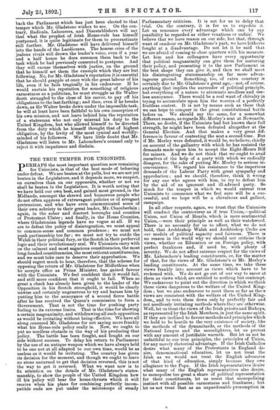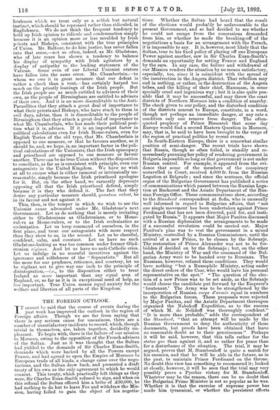THE TRUE TEMPER FOR UNIONISTS.
PERHAPS the most important question now remaining for Unionists, is that of the best mode of behaving under defeat. We are beaten at the polls, but we are not yet beaten in the Legislature, and it depends more, we suspect, on ourselves than on our opponents, whether or not we shall be beaten in the Legislature. It is worth noting that we have held our own best, and gained most ground, in the Midlands, amongst the shrewd and humorous people who do not often approve of extravagant policies or of arrogant pretensions, and who have even communicated some of their own sobriety to their great leader, Mr. Chamberlain ; again, in the sober and discreet boroughs and counties of Protestant Ulster ; and finally, in the Home Counties, where Gladstonian legends have no vogue at all. If we are to defeat the policy of disintegration, we must appeal to common-sense and common prudence ; we must not push partisanship too far ; we must not try to outdo the Welsh in their political fury, or the Scotch in their perfervid logic and their revolutionary zeal. We Unionists carry with us the calmest and most sagacious constituencies, the most long-headed constituencies, the most reticent constituencies, and we must take care to deserve their approbation. We should regret much to hear, therefore, that the scheme for opposing the return of Mr. Gladstone for Midlothian when he accepts office as Prime Minister, has gained favour with the Unionists. We feel confident that it would fail, and still more confident that it ought to fail. When so great a cheek has already been given to the leader of the Opposition in his Scotch stronghold, it would be clearly unwise and certainly ungenerous to try and harass him by putting him to the annoyance of a second fierce battle after he has received the Queen's commission to form a Government. That is not the time for pushing party feeling to its extreme limits. That is the time for showing a certain magnanimity, and withdrawing all such opposition as would be irritating without being effective. We have all along censured Mr. Gladstone for not saying more frankly what his Home-rule policy really is. Now, we ought to put no needless obstacle in the way of his producing that policy. The battle has been fought, and fought on our side without success. To delay his return to Parliament by the use of an antique weapon which we have always held to be one not at all adapted to our own time, would be as useless as it would be irritating. The country has given its decision for the moment, and though we ought to leave no stone unturned to get that decision reversed, this is not the way to get it reversed. What we want now is to fix attention on the details of Mr. Gladstone's states- manship, to show the people of the United Kingdom how ill his policy will bear the home-thrusts which it will receive when his plans for combining perfectly incom- patible ends are put under the microscope of steady Parliamentary criticism. It is not for us to delay that trial. On the contrary, it is for us to expedite it. Let us renounce every advantage which can by any possibility be regarded as either vexatious or unfair. We believe that we have reason on our side, but that, through want of candour on Mr. Gladstone's part, we have hitherto fought at a disadvantage. Do not let it be said that we are afraid of coming to close quarters with his measure. Let him and his colleagues have every opportunity that political magnanimity can give them for maturing their policy, and presenting it to the new Parliament in the best shape they can give it, and then we shall meet his disintegrating statesmanship on far more advan- tageous ground. Something, too, of extra courtesy is certainly due to Mr. Gladstone's great age,—not, of course, anything that implies the surrender of political principle, but everything of a nature to attenuate needless and use- less annoyance. There would be a real want of chivalry in trying to accumulate upon him the worries of a perfectly fruitless contest. It is not by means such as these that we can hope to conquer in the great constitutional battle before us. We should say the same, for a somewhat different reason, as regards Mr. Morley's seat at Newcastle. There, no doubt, if the Unionists had but known their full strength, he might have been defeated altogether at the General Election. And that makes a very great dif- ference in favour of contesting the seat a second time. But if Mr. Morley were defeated, it would be, we believe, chiefly on account of the gallantry with which he has resisted the demands made upon him to accept the Eight-Hours Bill for miners. And we do not think that we ought to avail ourselves of the help of a party with which we radically disagree, for the sake of putting Mr. Morley to serious in- convenience. We regard his resistance to the imperious demands of the Labour Party with great sympathy and approbation ; and we should, therefore, think it wrong for any one who agrees with him, to try to defeat him by the aid of an ignorant and ill.advised party. So much for the temper in which we would entreat true Unionists to commence what we feel sure will be a suc- cessful, and we hope will be a chivalrous and gallant, campaign.
In all other respects, again, we trust that the Unionists will conduct the controversy as if true Union,—political Union, not Union of Hearts, which is mere sentimental Union,—were their principle as well as their watchword. There is no necessity for us to affect, what we do not hold, that Archbishop Walsh and Archbishop Croke are our models of political sagacity and fairness. There is no reason in the world why we should not criticise their views, whether on Education or on Foreign policy, with perfect frankness and, if need be, with plenty of severity. We do not affect extreme respect for the views of Mr. Labouchere's leading constituents, or, for the matter of that, for the views of Mr. Gladstone's or Mr. Morley's leading constituents. At the same time, we take these views frankly into account as views which have to be reckoned with. We do not go out of our way to sneer at them as views which are entitled to nothing but contempt. We endeavour to point out the direction in which we think these views dangerous to the welfare of the United King- dom ; but we also endeavour to meet them so far as there views are consistent with the welfare of the United King- dom,. and to vote them down only by perfectly fair and not needlessly irritating methods where they are otherwise. Well, let us treat the views of the Irish priests and Bishops, as represented by the Irish Members, in just the same spirit. If they are inclined to favour methods and principles which we hold to be hostile to the very existence of society, like the methods of the dynamitards, or the methods of the National League and the moonlighters, let us protest with any amount of justifiable warmth. But let us not be unfaithful to our true principles, the principles of Union, for any merely rhetorical advantage. If the Irish Catholics desire what many of the Protestants in England de- sire, denominational education, let us not treat the Irish as we would not treat the English advocates of that kind of education, simply because they owe allegiance to the Pope. If the Irish representatives desire what many of the English representatives also desire, to monopolise too great a share of political representation for their constituents, let us resist that monopolising instinct with all possible earnestness and frankness ; but let us not treat that as an unpardonable presumption in Irishmen which we treat only as a selfish but natural instinct, which should be repressed rather than ridiculed, in Englishmen. We do not think the frequent tendency to hold up Irish opinion to ridicule and condemnation simply because it is an opinion more or less moulded by Irish priests and Bishops, consistent with the true principles of Union. Mr. Balfour, to do him justice, has never fallen into that error,—not so often, indeed, as Mr. Gladstone, who of late years has shown a tendency to balance his display of sympathy with Irish agitators by a display of antipathy to the leading statesmen of the Vatican. Some even of our Liberal Unionist orators have fallen into the same error. Mr. Chamberlain,—to whom we owe it in great measure that our defeat is • rather a check than a rout,—has certainly harped too • much on the priestly leanings of the Irish people. But the Irish people are as much entitled to advisers of their own, as the people of Birmingham are entitled to advisers of their own. And it is no more discreditable to the Anti- Parnellites that they attach a great deal of importance to what their priests and Bishops, who have stuck to them in evil days, advise, than it is discreditable to the people of Birmingham that they attach a great deal of importance to what Mr. Chamberlain, who has made their political posi- tion what it is, advises. If it is an important factor in political calculations even for Irish Home-rulers, even for English Tories of the old type, that Mr. Chamberlain is opposed to one measure, or that he favours another, so it should be, and, we hope, is, an important factor in the poli- tical calculations of the Unionists, that the Irish episcopacy and priesthood are opposed to one measure or favour ' another. There can be no true Union without the disposition to conciliate, as far as is consistent with principle, even our antagonists in the United Kingdom. We have no wish at all to excuse what is either immoral or intrinsically un- reasonable, simply because the Irish priesthood apologise for it. But, on the other hand, we earnestly deprecate opposing all that the Irish priesthood defend, simply because it is they who defend it. The fact that they desire any particular measure should, quantum, valeat, be in its favour and not against it. This, then, is the temper in which we wish to see the Unionist cause advocated under Mr. Gladstone's next Government. Let us do nothing that is merely irritating either to Gladstonians as Gladstonians, or to Home- rulers as Home-rulers, or to the Irish ecclesiastics as ecclesiastics. Let us keep command of ourselves, in the first place, and treat our antagonists with more respect than they show to us, in the second. Let us be cheerful, confident, calm, and constant. Let us have no such Gladstone-baiting as was too common under former Glad- stonian regimes. And let us have no anti-Catholic cries. Let us indulge in no scornful invectives against the ignorance and selfishness of the " Separatists." But all the more for our prudence, reticence, and courtesy, let us be vigilant not to give way one inch to the principle of disintegration,—i.e., to the disposition either to treat Ireland as more important than any equal area of England, or, so far as it is in exceptional need of help, as less important. True Union means equal anxiety for the welfare and liberties of all parts of the Kingdom.



































 Previous page
Previous page